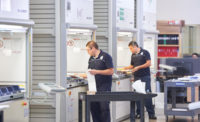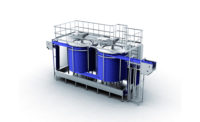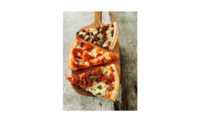How continuous cooking, chilling systems ramp up production

As food processors around the world increase production and gain access to international markets, they are shifting from conventional batch processing to more advanced and efficient continuous cooking, chilling and freezing systems.
To remain competitive and still meet consumers’ broadening preferences, large and small processors are adopting continuous systems of various capacities that can provide higher productivity, dramatically increased yields and improved food safety and quality.
One range of continuous cooking equipment garnering more and more attention are sous-vide cookers, small footprint “spiral” ovens and continuous grilling systems for searing and charmarking—anything that can further automate this “value-added” market. Each of these eliminates inefficiencies of batch cooking, including manual loading, inconsistent results, double handling and extended cooking times.
Paarman Foods, for instance, incorporated a highly efficient spiral oven into its production facility to facilitate the company’s rapid growth.
Paarman Foods, a family-owned food processor based in Cape Town, South Africa, produces a wide selection of protein products for retailers, private label companies and foodservice providers. It was founded in the 1980s by Ina Paarman, who was inspired by her grandma’s homemade recipes. She combined elements of many ethnic cuisines with the uniquely South African style, and after a successful teaching and lecturing career, started Ina's Kitchen, creating various mixes of spices and seasonings in a converted garage at her home in Cape Town.
In the 1990s, Ina’s son Graham expanded the food processing facility and product line to providing a diverse product offering to both local and international markets.
As Paarman Foods continued to grow, it was confronted with the need to ramp up production. Yet, management was insistent on incorporating manufacturing processes and equipment that would enable the company to continue with its passion—producing authentic home-style foods—but now in increased volumes.
“We continuously revisit our recipe formulations and production methods in a quest to make ‘homemade food’ on a factory scale,” says Nikki Edwards, manager of product development. “Our philosophy is to base our recipes on classic ingredients and preparation methods to develop a product that is instantly ready-to-eat, yet delivers the same experience as if the customer had made it themselves from scratch.”
Recently, Paarman Foods acquired more advanced equipment to cook a number of spiced protein products (lamb, chicken and beef) as well as vegetables used in various products. The equipment upgrade would provide greater throughput while preserving the traditional authenticity of these foods.
In 2015, it acquired a Micro Spiral Oven to cook vegetable and protein products such as seasoned lamb, beef and chicken dishes.
Developed and manufactured by Unitherm Food Systems, Bristow, Okla., this spiral oven provides a number of benefits over linear ovens. The “micro” oven is a small, compact version of a variety of sizes available from Unitherm that still maintains home-style food qualities.
Micro Spiral Ovens are sized as entry-level systems that are productive, versatile and boast the flexibility of a batch system, yet can roast, steam, bake or combination cook.
“The flexibility of Unitherm’s spiral oven enables us to cook a wide variety of meats and vegetables in order to react quickly to changing market trends in the future,” Edwards says. “The on-board controls enable us to utilize many different recipes and also scale up on product throughput as required to meet increasing demands. At the same time, the automation features of the equipment allow us to enhance productivity through labor savings.”
Looking for a reprint of this article?
From high-res PDFs to custom plaques, order your copy today!





